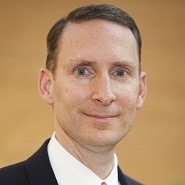
Daniel Barchi, CIO, NewYork-Presbyterian
Of the many experiences Daniel Barchi has had during his career, perhaps none was more valuable than the first time he drove a US Navy ship. What he quickly learned? “Go fast and make things happen.”
As he explained at the CHIME21 Fall Forum, despite the size of the ship (which was the length of two football fields), the weaponry it contained (including 120 missiles) and the fact that it had no brakes, the optimal strategy was, indeed, to go fast.
What he realized was that by going slow and trying to avoid hitting things, the risks only increase. And so, when his captain told him to crank it up to 35 knots — the equivalent of about 40 miles per hour — he complied. “We were going so fast that nothing could hit us. When you’re going slow, you have to look everywhere, because anything can overtake you. You’re basically a sitting duck.” By going fast, the ship became a moving target, which is much more difficult to hit.
“That’s something I share with my team all the time: go fast,” said Barchi, who was named CHIME CIO of the Year. “The faster you go, the more things you make happen.”
It was a lesson they were able to apply during the early stages of Covid-19, when New York City became a pilot site for managing the challenges of the pandemic. NewYork-Presbyterian, which had already become a leader in telehealth adoption, rapidly expanded its virtual care capabilities, developed predictive models for ventilator use, and doubled the number of ICU beds.
Most importantly, Barchi and his team were quickly to share best practices with other organizations — even competing health systems — whether it was through phone calls, emails, or podcast interviews, said CHIME CEO Russell Branzell, who presented Barchi with the award. “He was willing to do whatever it took to share the knowledge they gained as this was preparing to hit everyone across the country.”
It’s consistent with the integrity and leadership he has demonstrated throughout his career, along with a “willingness to serve and put others first,” Branzell added. “His visionary outlook has forged a new paradigm for how the CIO can make a significant difference in a healthcare organization’s mission and vision.” In addition to that, Barchi has remained committed to the development of future leaders, as evidenced by the fact that 10 of his team members have advanced to CIO roles.
Barchi, in turn, expressed gratitude for the many leaders who helped shape his path, and for organizations like CHIME that help nurture mentoring relationships. “I feel very fortunate to be part of this group,” he said.
During the Fall Forum, a number of other leaders earned accolades, including the following:
- CHIME Innovator of the Year – Ben Mansalis, MD, VP & CIO, INTEGRIS Health
- Federal Public Policy Award for CIO Leadership – Robert Latz, CIO, Trinity Rehabilitation Services
- CHIME Foundation Industry Leader Award – Bruce Cerullo, Board Chair, Nordic Consulting Partners
- Transformational Leadership Award – Bryan Bliven, CIO, MU Healthcare


Share Your Thoughts
You must be logged in to post a comment.